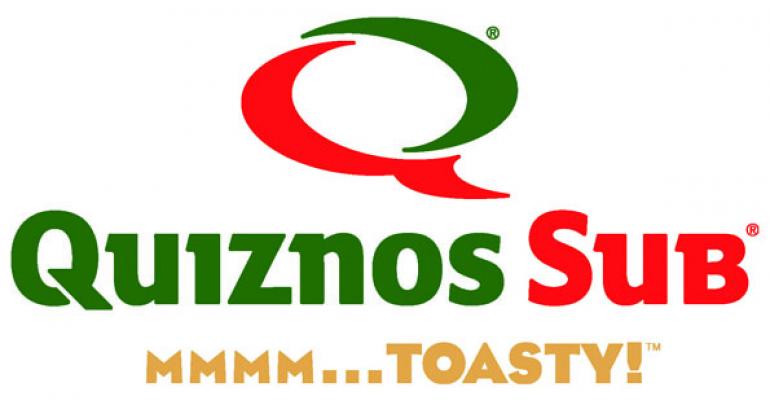Franchisees of the troubled Quiznos chain expressed confidence on Friday that a reported restructuring effort would be resolved, allowing long-overdue progress on proposed changes to the concept’s business model.
The statement from the Quiznos franchisee association, or QzFA, came in response to a report in The Wall Street Journal on Thursday that the Denver-based franchisor is preparing to file for Chapter 11 bankruptcy protection after spending weeks negotiating with creditors on a restructuring plan to address a $570 million debt load.
Quiznos officials had no comment on the report.
RELATED
• Quiznos seeks to restructure debt
• Quiznos to offer toasty pastas nationwide
• More restaurant finance news
In December, however, the company confirmed it had negotiated a forbearance agreement that would give the chain liquidity as it worked with its creditors on debt restructuring.
“We are expecting that the debt situation will get resolved and will allow long-overdue changes to the business model,” the QzFA board said in a statement Friday. “The QzFA Board has made recommendations to the Quiznos management team on changes to the business model that need to be made as part of this restructure to help struggling franchisees and stop store closures by increasing franchisee profitability.”
The sandwich chain’s franchise operators have long argued that the concept’s business model is broken. A common theme in many lawsuits filed by current and former operators is the notion of hidden markups to food and supplies that franchisees are contractually obligated to buy from the franchisor’s supply arm.
While the sandwich chain has been growing overseas, where it has 670 locations and the goal of reaching 1,000 units by 2020, Quiznos’ domestic unit count has dropped dramatically as franchisees struggle to stay afloat.
The chain ended fiscal 2013 with 1,450 domestic locations, falling from 1,930 in the prior year.
In 2006, Quiznos had more than 5,000 locations. Franchisees say the brand stood apart as a more premium alternative to sandwich giant Subway at that time.
According to the Wall Street Journal, Quiznos restaurants averaged about $425,000 in annual sales in the mid-2000s. Today that average has dropped to about $300,000 for top-performing locations.
Recession takes a toll
(Continued from page 1)
The recession and the sputtering economic recovery have not been kind to Quiznos, said Kevin Burke, managing director of Trinity Capital LLC. In addition, the sandwich landscape has become much more competitive, with fast-casual brands like Potbelly, Firehouse Subs and Jimmy Johns pitching quality ingredients and freshness in a way that appeals to Millennials.
“Quiznos’ message of fresh and toasted and the melted things that they do was unique years ago, but now those things are available everywhere, and Quiznos has lost its edge,” said Burke.
Ultimately, the chain got stuck between quality and price, he added. “They had better quality than brand X, but a higher price than brand X,” he said. “They didn’t have good national media, and the unit-level economics were just insufficient for what they were trying to do.”
Two years ago, Quiznos narrowly avoided bankruptcy with a debt-for-equity swap that shifted ownership to New York-based hedge fund Avenue Capital Group.
At the time, Avenue Capital injected about $150 million into the sandwich chain and cleared about one-third of the then-$870 million debt load. The new owners brought in Stuart Mathis, the former president of The UPS Store chain and a former Domino’s Pizza franchising executive, as chief executive of Quiznos.
Since that time, Quiznos has attempted brand repositioning with premium menu offerings. This week, for example, the company rolled out a new line of Toasty Pastas, adding an all-new menu platform to the sandwich lineup.
Such changes, however, don’t go far enough, said Burke. “It’s a great chain with a lot of potential, but a lot of adjustments have been nuances and not complete surgery,” he said. “They need to think about the menu, pricing, the advertising message and doing real surgery on the P&L so the four-wall economics are improved.”
Craig Weichmann, founder of boutique investment banking firm Weichmann & Associates in Dallas, said it’s not clear how a bankruptcy filing will impact franchisees. Much may depend on whether creditors come to an agreement on a pre-packaged bankruptcy plan, which would likely allow management to remain in place.
Typically bankruptcies offer the benefit of allowing restaurant companies to walk away from bad lease situations, but Quiznos is almost entirely franchised, and the individual operators will not see relief from such obligations.
Still, bankruptcy has its happy endings.
Weichmann pointed to other largely franchised chains, such as IHOP and Denny’s, that have been through the bankruptcy process years ago and emerged as healthier operations.
Often, however, chains emerge from bankruptcy with new ownership, which also can bring about change. For Quiznos franchisees, he said, change could be a challenge.
“Generally change requires new equipment, face lifts, more advertising. Generally, change is costly,” he said. “If you’re in financial straits as a franchisee, can you really do that?”
Contact Lisa Jennings at [email protected].
Follow her on Twitter: @livetodineout

